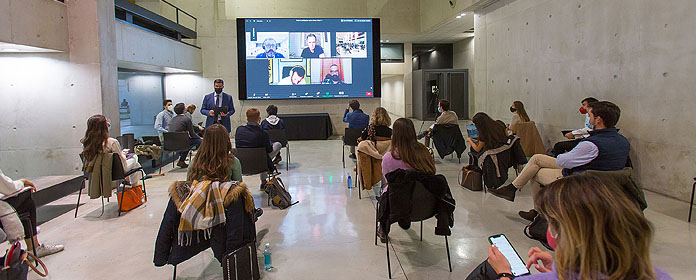"It's likely that there will be a turnaround in the U.S. elections, because a lot of mail-in voting will be Democratic."
Four University of Navarra graduates, correspondents in Washington, Moscow, Beijing and Jerusalem, discuss the impact of the elections on the world.

"It is likely that there will be a turnaround in the U.S. elections, because a lot of mail-in votes will be Democratic," says Pablo Pardo, correspondent in Washington. The journalist participated along with three other alumni of the School of Communication of the University of Navarra in a webinar on the impact of the U.S. elections in the world. Also participating in the meeting were Marc Marginedas (Moscow), Jaime Santirso (Beijing) and Mikel Ayestarán (Jerusalem).
Pablo Pardo explained the limitations of the electoral process: "There is no central electoral board and you can vote with the water invoice because there is no National Identity Card. In addition, a large part of the vote will be by mail". As he said, much of this vote will be Democratic because Republicans are more questioning the impact of COVID and it is likely that as the votes are counted, there will be a flip-flop. "The big issue is the potential violence if the results are challenged," he stressed.
He also spoke about U.S. relations with Latin America and specifically Venezuela. "US policy towards Latin America goes through Florida. It is not going to invade Venezuela, it is going to put a cordon sanitaire and, without producing oil, it is going to decompose. If Biden touches topic it is because he wants to win votes in Florida". In his opinion, the U.S. does not care about Venezuela, Cuba or Latin America. "The tragedy of Hispanics is to be between a party that hates them (Republicans) and another that ignores them (Democrats)".
Relations with China and interference from the KremlinJaime Santirso, correspondent in Beijing, referred to relations with China. "The US is reevaluating its policy towards China. Since 1972, with Nixon and Kissinger, there was a rapprochement. China has to appreciate the break that Trump has made in that tradition but it is very unlikely that Biden will bring the relationship back to earlier stages because the nature of the relationship has changed."
For his part, Marc Marginedas, correspondent in Moscow, responded to questions about Russian interference on the previous elections: "We have no evidence that Trump is linked to the Kremlin, but he has made some shocking decisions regarding the Kremlin's policies and activities. The true extent of possible Russian interference can only be investigated when Trump is no longer president."
Mikel Ayestarán, Middle East correspondent, focused his exhibition on the case of Israel, where it is seen as a quasi-local election, with 300,000 Americans. "The Republican party campaigns here, but the question is who is the best candidate for Israel. Their diary for the Middle East is Benjamin Netanyahu," he noted.
Regarding Iran, he stressed that the agreement that was reached is at a standstill. "Iran is suffering sanctions when they are complying with the nuclear agreement . They are waiting for the U.S. to change or receive European support, because they need to sell their oil already."
